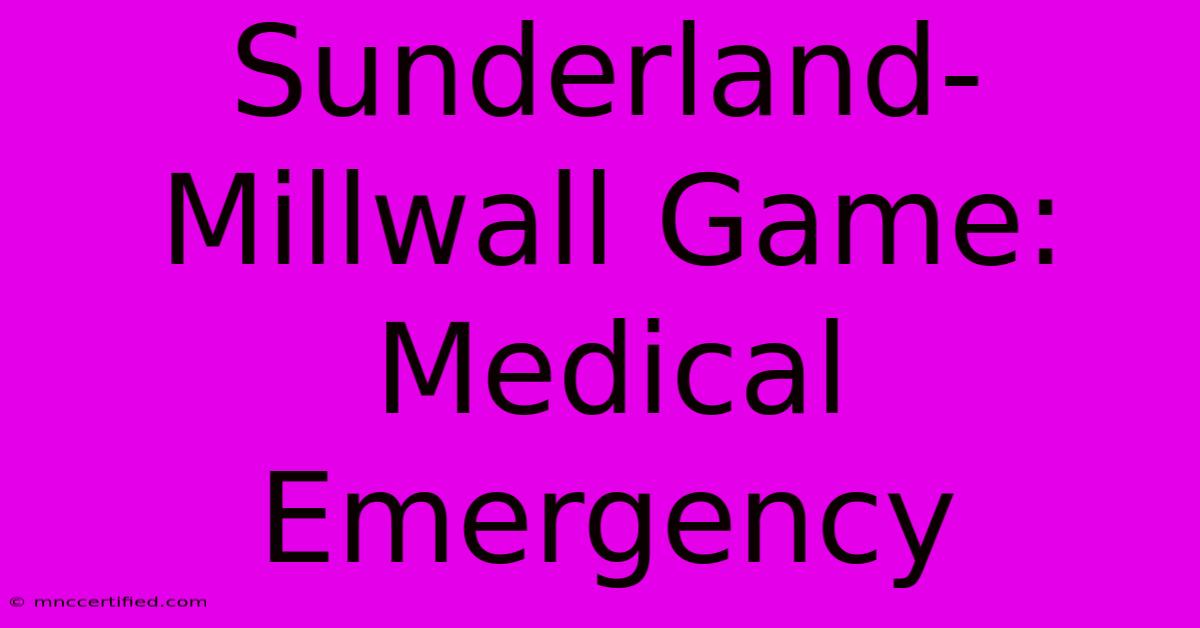Sunderland-Millwall Game: Medical Emergency

Table of Contents
Sunderland-Millwall Game: A Medical Emergency and the Stadium's Response
The recent Sunderland-Millwall Championship match at the Stadium of Light was unfortunately overshadowed by a serious medical emergency involving a spectator. While the final score – [Insert Final Score Here if available, otherwise remove this sentence] – is important, the immediate priority and focus shifted to the well-being of the individual requiring urgent medical attention. This incident highlights the crucial role of rapid response and effective emergency protocols within large-scale sporting events.
The Incident: What Happened?
Details surrounding the specific nature of the medical emergency are understandably limited to protect the privacy of the individual involved. However, reports suggest that a spectator required immediate medical assistance during the match. The urgency of the situation became apparent to those around, leading to a visible disruption in the game's flow.
The Stadium's Response: Swift Action
Credit must be given to the immediate response of the Stadium of Light's medical team, stewards, and other staff. Reports indicate that emergency services were contacted swiftly, and medical personnel were on the scene quickly. The speed and efficiency of their actions likely played a crucial role in providing timely assistance. Effective emergency planning and training are paramount in situations like these. The coordinated response showcased the preparedness of the stadium's emergency protocols.
Lessons Learned and Best Practices
This incident serves as a stark reminder of the potential for medical emergencies in large public gatherings. While unexpected, such events underscore the need for robust contingency plans within stadiums and event venues. Key elements of effective emergency response include:
- Well-trained medical personnel: Having readily available, highly-trained medical professionals on-site is crucial for immediate assessment and treatment.
- Clear communication protocols: Efficient communication between staff, emergency services, and spectators is essential for smooth and rapid response.
- Accessible emergency exits and routes: Easy-to-identify and easily accessible routes for emergency vehicles and for the movement of the injured are vital.
- Regular training exercises: Simulated emergency drills help staff familiarize themselves with protocols and ensure a coordinated response during a real emergency.
- Clear signage and information for spectators: Providing clear directions to first aid stations and other important locations enhances spectator safety.
Beyond the Stadium: Individual Responsibility
While the stadium's response is critical, individual awareness also plays a role in ensuring spectator safety. Knowing basic first aid and being aware of your surroundings can contribute to a safer environment for everyone.
The Aftermath and Ongoing Support
Information regarding the individual's condition remains limited to respect their privacy. However, it's hoped that they are receiving the best possible care and support. The incident highlights the importance of community spirit and collective action during times of crisis.
Conclusion: A Test of Preparedness
The medical emergency at the Sunderland-Millwall game presented a significant challenge, but it also demonstrated the importance of well-planned emergency protocols and the dedication of the stadium's staff. While the focus rightfully remains on the well-being of the affected individual, this event serves as a valuable learning opportunity for improving safety and preparedness within all sporting venues. The swift and effective response should be commended, while simultaneously emphasizing the ongoing need for continuous improvement and review of emergency procedures.
Keywords: Sunderland Millwall, Stadium of Light, Medical Emergency, Emergency Response, Stadium Safety, Football Match, Championship Football, Spectator Safety, First Aid, Emergency Protocols, Event Safety, Emergency Planning, Sporting Event Safety.

Thank you for visiting our website wich cover about Sunderland-Millwall Game: Medical Emergency. We hope the information provided has been useful to you. Feel free to contact us if you have any questions or need further assistance. See you next time and dont miss to bookmark.
Featured Posts
-
Leicester City Vs Chelsea Final Result Live
Nov 24, 2024
-
Erny Insurance Agency Lafayette
Nov 24, 2024
-
Takeaways Rutgers Football Defeat
Nov 24, 2024
-
Commercial Auto Insurance Tampa
Nov 24, 2024
-
Leicester Vs Chelsea Premier League Final Score
Nov 24, 2024